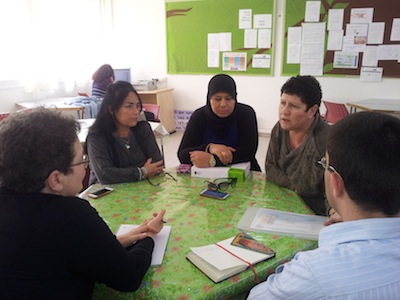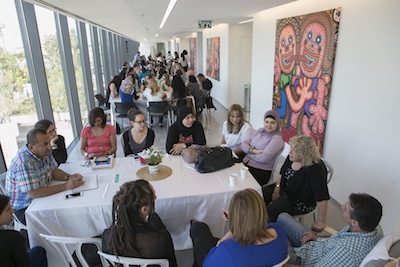English class at Shaked School in Raanana. The school participates in the Arab Teacher Integration in Jewish Schools program. The teacher’s name is Fatam and she is from the Arab town of Tayibe. (photo from Merchavim)
In a country of eight million, one-fifth of Israel’s population are Arabs. According to research published last year in the Jerusalem Post, 35% of Jewish teenagers have never spoken to an Arab peer and 27% of Arab Israelis reported never having spoken with a Jewish youth.
In a conflict-ridden political climate, there is no shortage of angry rhetoric. Reading this rhetoric, it is tempting to imagine that Israeli society is simply a dysfunctional collection of intergroup battles. Nonetheless, there are organizations that remain focused on Israel’s immense social capital, its long history of social innovation and the initiative and dedication of its educators. Guided by words like tolerance, fairness and mutual understanding, these organizations value diversity rather than emphasize differences, and continue to work to build a more egalitarian society.

Merchavim Institute is one such organization. Founded in 1998 and based in Lod, Merchavim promotes shared citizenship in several ways. It places Arab teachers in Jewish schools, to teach spoken Arabic. It offers a wealth of classroom materials to teachers and supports 500 schools and kindergartens in the Jewish-secular, Jewish-religious and Arab-Israeli school streams.
In a separate collaboration with the Ministry of Education, Merchavim also places Arab teachers of English, science and mathematics in Jewish schools. These teachers cover material on Arab culture and society.
Merchavim’s chief operating officer, Roi Maor, explained that “dialogue, shared culture, education and improved communication” are essential if one wants to stem the flood of anger and resentment on both sides. Rather than getting stuck on debates about the country’s flag, for example, he argued, “Israel’s best chance for growth and self-improvement is through programs that focus on enrichment.”
The Arabic Teacher Integration (ATI) program does just that, by giving Arab teachers an opportunity to work in and become part of a Jewish community. But, quite apart from meeting their curricular goals, these teachers – all of whom are women – are excellent role models, said Maor. He described them as resilient and “charismatic, with exceptional leadership skills.”
Nonetheless, he acknowledged, “There is a degree of concern or tension when an Arab teacher enters a Jewish school; half of these teachers wear headscarves. Often, the teacher herself has her own concerns and worries, concerns about how she will be integrated.” Since more than one teacher has been stopped by school security and refused entry, these concerns seem valid.
Fortunately for the teachers, Merchavim’s idealism is tempered with the clear-sighted pragmatism of lived experience. Encounters between Arab teachers and their Jewish students and colleagues follow a framework, leaving little to chance. Maor wants the ATI program to be “the gold standard” and explained how encounters must be continuous. “They have to happen in the context of a larger project and be a powerful, meaningful experience,” he said.
Maor also respects the students’ “legitimate desire to maintain and preserve [their] cultural identity.” He believes that one’s identity is a tool to meet the other, rather than a hindrance or a threat. “It allows you to understand and connect to your own identity better,” he said.
Of course, change does not happen overnight. Tamara Klinger-Levi, Merchavim’s director of resource development, reflected that, even with a wonderful start to the school year, acts of violence create a “public sentiment of hatred or prejudice,” which can be a tremendous setback for Merchavim staff and partners.
Rana Younis has been teaching at Gvanim Junior High School, Kadima-Zoran, for nine years. She related an incident in her school, where she had overheard a student speaking ill of Arabs. There had been a violent incident and emotions were running high. Having turned and seen her, the student apologized instantly. “I am sorry,” he said. “It’s not you.” Younis told him, “I understand, it’s not you and it’s not me, and he hugged me. It was so touching. I tell them: there are bad people and good people in Arab society, just like any society.”
Merchavim staff are well aware of this dynamic and their staff make regular visits to Gvanim. Younis is unequivocal in her praise of the support they offer. “They help me all the time. They are like my family,” she said.
A highlight of the program comes in the form of tours for overseas visitors. This is an example of the kind of “powerful, meaningful experience” described by Maor. “Children don’t have a strongly formulated notion of [Arabs]. All kinds of negative ideas flourish in isolation but [with Merchavim teachers] all that evaporates. They learn to regard each person as an individual. We are building a generation that doesn’t generalize.”
Younis’ observations confirm this. “Reality is not what you read,” she said. “Putting the idea of Arabs and Jews aside, I am just there to teach. I love my work as a teacher. I love my students.”
Younis’ voice conveys energy, dedication and love. She spoke of an upcoming collaboration between Israeli and Arab students, called
Living Together, for which only a limited number of places was available. “When some of the students didn’t get in, they cried, they were so disappointed,” she said.
About what her own family thought of her work, Younis laughed as she related her mother’s frequent questions. “Are you OK, are you happy? I tell her, I am happy! I have no problems.”

Merchavim’s contribution to Israeli education and society at large have gained recognition at home and abroad. The new language initiative of Israel’s education ministry, led by Naftali Bennett (Jewish Home), dovetails nicely with Merchavim’s vision. In this program, Arab students will learn Hebrew starting in kindergarten and continue right through high school. As Likud MK Oren Hazan said last year (Israel National News), “When the Jewish population understands Arabic the way the Arab public understands Hebrew, we will see better days.”
Thanks to the investments of Merchavim and other organizations, these ways of thinking could become the norm for a whole generation of children. These children will finish school and assume leadership positions in society. When they do, they will have communication skills, as well as the empathy and cultural capital needed to reinvest in a fair future for all Israelis.
Speaking of the wider Arab population, Maor said Merchavim’s program “sends a message to people back in the communities that they can be successful in Jewish society.” And, while Arab women meet the urgent need for more teachers in the Jewish system and find empowerment through work, their presence enriches the entire school site.
The Arab Teacher Integration program enjoys financial support from numerous philanthropic groups in Israel, all of which support civil rights, social justice and democracy in the country. These include the Moriah Fund, the Beracha Foundation and the Jacob and Hilda Blaustein Foundation. Overseas funders include the Jewish Federations of North America and the Hadassah Foundation, which also works in Israel.
Nonetheless, even with this and the Ministry of Education support for Merchavim’s work, funding remains a challenge. Discretionary budgets for enrichment are small and programs like music are typically prioritized above Arabic electives. Maor, who finds it “outrageous” that Arabic is not a mandatory subject in Israeli schools, described this as a “missed opportunity for cross-cultural learning and huge advancement for the cause of shared society in Israel.”
However, Maor is optimistic about the future because “animosity and fear comes from ignorance.” With long-term, committed professional relationships between Arab and Jewish educators, and between Arab teachers and their Jewish students, Israeli society can change. “Citizenship is not just a piece of paper,” said Maor. “It’s about being part of a collective enterprise, in which we share a joint destiny.”
That destiny relies on every individual having the right to prosperity under egalitarian social and economic conditions. Once the majority of Israelis understand this, he said, they will also see that “the success of Israeli Arabs is not a separate phenomenon but a boon to all sectors of the population.”
To learn more about Merchavim, visit machon-merchavim.org.il/?lang=en.
Shula Klinger is an author, illustrator and journalist living in North Vancouver

